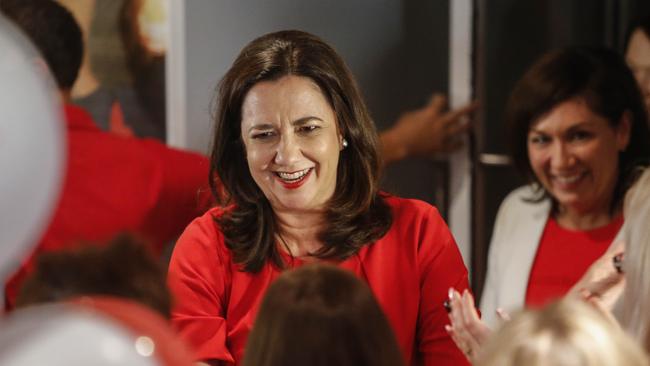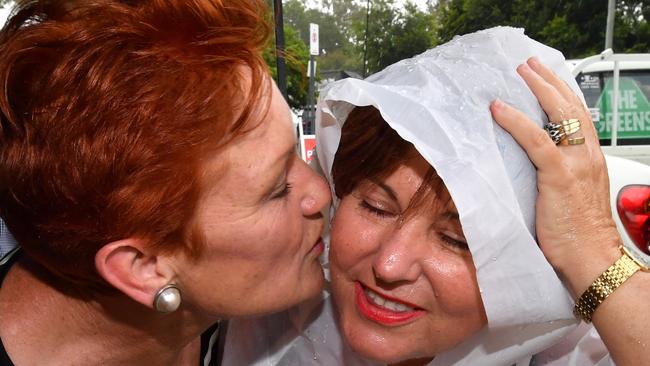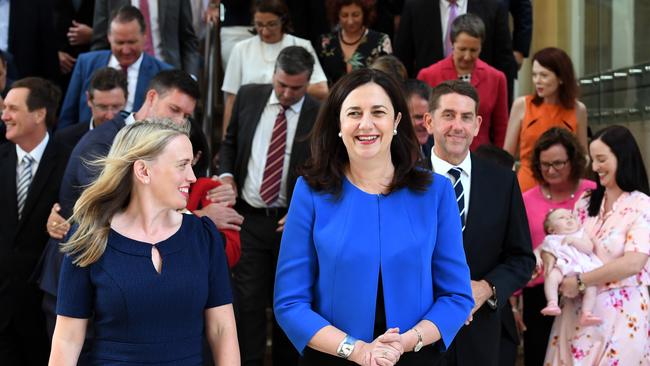In politics, it’s the destination of a seat in parliament that counts, not the campaign journey
IN politics it’s not the bumpy campaign journey but the destination to sit on government ministerial leather that matters, writes Paul Williams.

QLD Election
Don't miss out on the headlines from QLD Election. Followed categories will be added to My News.
EVERYONE who’s had a letdown, a heartbreak or personal hardship has heard the words, “it’s not the destination but the journey that matters”.
Please, save it for the Hallmark card.
In politics, of course, it’s the destination. The campaign journey is bumpy and painful but the destination of planting your backside on government ministerial leather is well worth it.
And while every one of the 453 candidates who stood for election on Saturday knows it, no one appreciates it more than the 48 Labor MPs Annastacia Palaszczuk will probably now command in a majority government.
Palaszczuk’s re-election – the first Australian female state premier to win successive elections (although the Northern Territory’s Clare Martin and the ACT’s Ros Follet and Kate Carnell also won successive terms) – guarantees her a place in Labor’s pantheon.
But Labor’s win had little do with policy and almost everything to do with personalities and perceptions. And that’s the difference a campaign can make.
Labor looked defeated after a tepid first week, especially after Palaszczuk pressed the Adani loan delete button and potentially exposed herself as an anti-jobs backflipper.
But the Liberal-National Party – determined to run a positive campaign – failed to exploit Labor’s weaknesses of debt, unemployment and cost of living, and allowed itself to be drawn into a vortex of LNP-One Nation uncertainty.
As it turned out, voters everywhere were quite pleased taxpayers’ money would not go to a rich multinational corporation.
But that’s not the main reason the LNP looks like claiming just 40 seats.
Anecdotally, many a moderate LNP voter in Brisbane, and on the Gold and Sunshine coasts, hated the idea of their party nuzzling up to One Nation’s neanderthal economics.

But a larger proportion of voters seemed more worried by the prospect of yet another hung parliament.
No one can claim Labor ran a smooth operation but, ultimately, Palaszczuk was successful because she took control of a Catherine wheel campaign and rammed home the message that a vote for One Nation or the LNP was a vote for instability.
The fact Labor shifted its rhetoric mid-campaign – from attacking LNP leader Tim Nicholls’ record as Campbell Newman’s treasurer, to one of “dodgy” LNP dealings with One Nation – suggests most voters didn’t care about Nicholls’ past.
Even so, not too many public servants would have voted LNP last Saturday.
Much will be written this week about One Nation’s “disaster” in this election.
But while the party’s campaign was shoddy (Hanson was missing for key parts of it, then fell foul of a sex-shop owner candidate and a resigning federal senator), One Nation’s primary vote wasn’t as poor as detractors insist.
Yes, the party’s 14 per cent is well down from this time last year when One Nation, dizzy with its double dissolution success, pulled 20-something per cent in opinion polls. But it’s still far better than its Western Australian result in March.
Moreover, One Nation’s 14 per cent is a state-wide total. When we average One Nation tallies out across the 61 seats it contested, the party’s vote nudges a more impressive 20.
That means the disdain One Nation voters have for the major parties, and regional angst around cost of living, alleged neglect and so-called political correctness, is certainly alive and well.
It just didn’t reach sufficient levels to translate into seats – a problem hindered by Queensland’s return to a model of compulsory preferential voting that forces Labor, Green and moderate LNP voters to preference against One Nation.
Labor’s future in the new parliament seems assured (as does Katter’s Australian Party which won two, and possibly three, seats), but what about Tim Nicholls, One Nation and the Greens?
Nicholls’ leadership is safe – for now. But if, in 12 months, the LNP trails Labor, expect a leadership challenge from Everton’s Tim Mander and Broadwater’s David Crisafulli.
The future for One Nation is far less secure. Despite a respectable vote, the party now risks drifting into irrelevancy.
For the Greens, the reverse is true. Emboldened by close results in Maiwar and South Brisbane, the Greens will redouble efforts to win inner-city seats.
Finally, history could very well repeat itself.
In 1925, Queensland’s United (Liberal) party merged with the Country (National) party to form the Country and Progressive National Party.
That outfit lost its first election a year after formation, then won, then lost after a single term, then lost again before disbanding a year later.
With the LNP now similarly losing two elections after a single term, the question is how long before the LNP’s tribes start talking about de-amalgamation? Watch this space.
Dr Paul Williams is a senior lecturer at Griffith University’s School of Humanities
Originally published as In politics, it’s the destination of a seat in parliament that counts, not the campaign journey


